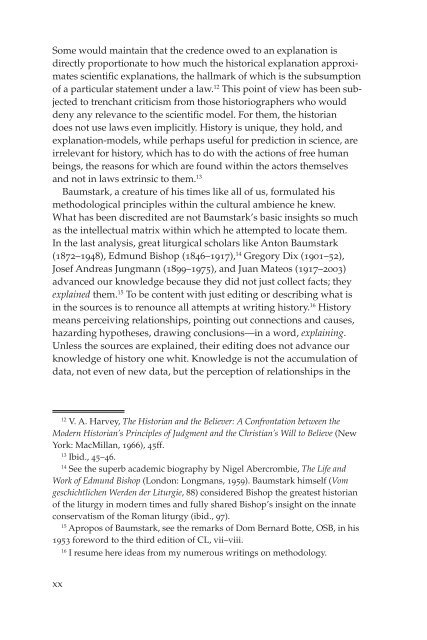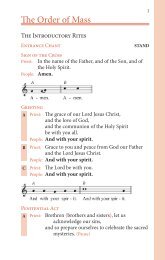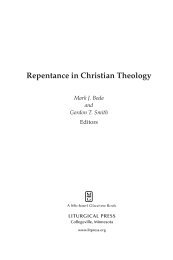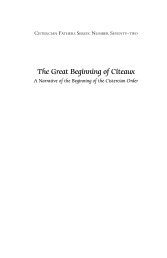“Fritz West, himself a methodological master of ... - Liturgical Press
“Fritz West, himself a methodological master of ... - Liturgical Press
“Fritz West, himself a methodological master of ... - Liturgical Press
Create successful ePaper yourself
Turn your PDF publications into a flip-book with our unique Google optimized e-Paper software.
Some would maintain that the credence owed to an explanation is<br />
directly proportionate to how much the historical explanation approximates<br />
scientific explanations, the hallmark <strong>of</strong> which is the subsumption<br />
<strong>of</strong> a particular statement under a law. 12 This point <strong>of</strong> view has been subjected<br />
to trenchant criticism from those historiographers who would<br />
deny any relevance to the scientific model. For them, the historian<br />
does not use laws even implicitly. History is unique, they hold, and<br />
explanation-models, while perhaps useful for prediction in science, are<br />
irrelevant for history, which has to do with the actions <strong>of</strong> free human<br />
beings, the reasons for which are found within the actors themselves<br />
and not in laws extrinsic to them. 13<br />
Baumstark, a creature <strong>of</strong> his times like all <strong>of</strong> us, formulated his<br />
<strong>methodological</strong> principles within the cultural ambience he knew.<br />
What has been discredited are not Baumstark’s basic insights so much<br />
as the intellectual matrix within which he attempted to locate them.<br />
In the last analysis, great liturgical scholars like Anton Baumstark<br />
(1872–1948), Edmund Bishop (1846–1917), 14 Gregory Dix (1901–52),<br />
Josef Andreas Jungmann (1899–1975), and Juan Mateos (1917–2003)<br />
advanced our knowledge because they did not just collect facts; they<br />
explained them. 15 To be content with just editing or describing what is<br />
in the sources is to renounce all attempts at writing history. 16 History<br />
means perceiving relationships, pointing out connections and causes,<br />
hazarding hypotheses, drawing conclusions—in a word, explaining.<br />
Unless the sources are explained, their editing does not advance our<br />
knowledge <strong>of</strong> history one whit. Knowledge is not the accumulation <strong>of</strong><br />
data, not even <strong>of</strong> new data, but the perception <strong>of</strong> relationships in the<br />
12 V. A. Harvey, The Historian and the Believer: A Confrontation between the<br />
Modern Historian’s Principles <strong>of</strong> Judgment and the Christian’s Will to Believe (New<br />
York: MacMillan, 1966), 45ff.<br />
13 Ibid., 45–46.<br />
14 See the superb academic biography by Nigel Abercrombie, The Life and<br />
Work <strong>of</strong> Edmund Bishop (London: Longmans, 1959). Baumstark <strong>himself</strong> (Vom<br />
geschichtlichen Werden der Liturgie, 88) considered Bishop the greatest historian<br />
<strong>of</strong> the liturgy in modern times and fully shared Bishop’s insight on the innate<br />
conservatism <strong>of</strong> the Roman liturgy (ibid., 97).<br />
15 Apropos <strong>of</strong> Baumstark, see the remarks <strong>of</strong> Dom Bernard Botte, OSB, in his<br />
1953 foreword to the third edition <strong>of</strong> CL, vii–viii.<br />
xx<br />
16 I resume here ideas from my numerous writings on methodology.






